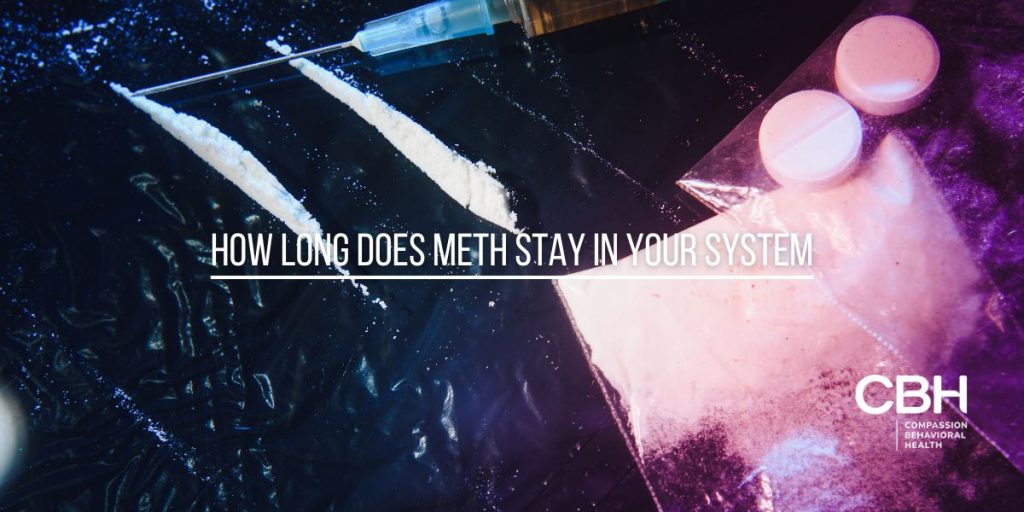Methamphetamine, commonly known as meth, is a highly addictive drug that can have long-lasting effects on the body. If you or someone you know has been using meth, it’s important to understand how long the drug can stay in your system. This knowledge can be critical for various reasons, such as potential drug tests or assessing the impact on your health.
How Long Does Meth Stay in Your System?
In short, how long meth stays in your system can vary based on various factors, from individual metabolism to the frequency and dosage of use. Before we look into it any deeper, let’s understand the basic pharmacology of methamphetamine and its mechanism of action in the body.
Understanding Methamphetamine
Methamphetamine, also called crystal meth, ice, or crank, is a powerful stimulant that affects the central nervous system. It produces an intense high that can lead to increased energy, focus, and euphoria. However, the effects of meth are not only short-lived, the drug can also have severe consequences on both physical and mental health.
Recent statistics highlight the widespread impact of this drug
According to the 2021 National Survey on Drug Use and Health, approximately 0.9% of individuals aged 12 or older, which translates to roughly 2.6 million people, reported using methamphetamine in the past year. These figures underscore the critical need for effective prevention and treatment strategies.
What is Methamphetamine?
Methamphetamine is a synthetic drug that is structurally similar to amphetamine and shares some of its effects. It is typically found as a white, bitter powder or in the form of clear crystals. Meth can be smoked, snorted, swallowed, or injected, and each route of administration affects the body differently.
The Effects of Meth on the Body

When meth enters the body, it quickly reaches the brain and increases the release of dopamine, a neurotransmitter associated with pleasure and reward. This flood of dopamine produces an intense rush that users find highly pleasurable. However, over time, repeated meth use can lead to significant damage to the brain, heart, and other organs.
The short-term effects of meth use include increased wakefulness, decreased appetite, and increased physical activity. Users may experience a surge of energy and feel invincible. However, these effects are short-lived, and the crash that follows can be brutal. The intense high is often followed by extreme fatigue, irritability, and depression.
Long-term meth use can have devastating consequences on both physical and mental health. Prolonged use can lead to severe dental problems, commonly known as “meth mouth.” The acidic nature of the drug, combined with poor oral hygiene, causes tooth decay, gum disease, and tooth loss. Users may experience rapid weight loss and malnutrition due to decreased appetite and neglect of basic self-care.
Meth use also dramatically affects brain function. Chronic meth users may develop cognitive impairments, including memory loss, attention deficits, and difficulty with problem-solving. Psychosis, characterized by paranoia, hallucinations, and delusions, is a common side effect of long-term methamphetamine use.
Furthermore, the risk of contracting infectious diseases such as HIV and hepatitis increases among meth users. This is due to risky behaviors associated with drug use, such as sharing needles or engaging in unprotected sex. Methamphetamine impairs judgment and decision-making, increasing the likelihood of engaging in risky sexual activities or needle-sharing practices.
While methamphetamine may initially provide a temporary escape from reality and a surge of energy, the long-term consequences are severe. From physical health issues like “meth mouth” and organ damage to mental health problems such as psychosis and cognitive impairments, the toll that meth takes on the body and mind cannot be ignored.
3 Key Factors Influencing the Duration of Meth in the System
Several factors can influence how long meth stays in your system. These factors vary from person to person and can impact the drug’s metabolism and elimination.
Understanding these factors can provide valuable insights into the duration of meth in the body, helping individuals make informed decisions about their health and well-being.
1. Dosage and Frequency of Use

The amount of meth used and how frequently it is taken can affect how long the drug remains detectable in the body. Higher doses and more frequent use can lead to a buildup of meth in the system, extending its presence.
It is important to note that meth has a half-life of around 10-12 hours. This means that it takes that amount of time for half of the drug to be eliminated from the body. However, it can take several half-lives for meth to be fully cleared from the system.
For instance, if someone takes a single dose of meth, it may take approximately 48-72 hours for the drug to be eliminated from their body, assuming an average half-life of 10-12 hours.
2. Individual Metabolism and Health Status

Each person has a unique metabolism that can affect how quickly their body processes meth. Factors such as age, weight, liver function, and overall health can influence the rate at which meth is metabolized and eliminated.
Individuals in good health and with efficient metabolisms may eliminate meth from their system more quickly compared to those with weaker metabolic systems. This is because a healthy metabolism is better equipped to break down and eliminate foreign substances, including drugs like meth.
Furthermore, certain health conditions or medications can impact the metabolism of meth, potentially prolonging its presence in the body. It is crucial for individuals to consult with their healthcare provider if they have any underlying health conditions or are taking medications that may interact with methamphetamine.
3. Drug Purity and Method of Use

The purity of the meth being used can also impact how long it stays in the system. More pure methamphetamine is typically metabolized and eliminated faster compared to meth that is cut or mixed with other substances.
When meth is cut or mixed with other substances, it can introduce additional compounds into the body that may take longer to metabolize and eliminate. This can prolong the duration of meth in the system, as the body works to process these additional substances.
Additionally, the route of administration can affect the duration of meth in the system. For instance, smoking or injecting meth leads to a more rapid onset of effects compared to snorting or swallowing. This is because smoking and injecting deliver meth directly into the bloodstream, allowing it to reach the brain more quickly. As a result, the body may metabolize and eliminate meth at a faster rate compared to other methods of administration.
It is important to note that the duration of meth in the system can vary significantly from person to person. Factors such as individual differences in metabolism, health status, and the specific characteristics of the meth being used can all contribute to this variability.
Understanding these factors can provide individuals with a better understanding of how long meth may stay in their system. However, it is always recommended to seek professional medical advice for personalized information and guidance.
How the Body Processes Meth
Understanding how the body processes meth can provide insights into how long it stays in the system and is detectable in various tests.
Absorption and Distribution
After meth is taken, it is rapidly absorbed into the bloodstream and distributed throughout the body, including the brain. This quick distribution explains the immediate effects experienced by users.
Metabolism of Meth
In the body, meth is primarily broken down by the liver through a process known as metabolism. This process converts methamphetamine into various metabolites, which can be detected in drug tests.
The metabolic breakdown of methamphetamine involves several enzymes, including Cytochrome P450, where genetic variations can impact the rate at which the drug is metabolized.
Excretion of Meth
Once metabolized, meth and its metabolites are excreted from the body through various routes, including urine, sweat, and feces. The primary route of excretion is through the kidneys, making urine tests the most common method of detecting methamphetamine.
Detecting Meth in the Body

Various drug tests can detect the presence of methamphetamine in the body. These tests are typically conducted for legal, employment, or medical reasons.
Urine Tests for Meth
Urine tests are the most commonly used method for detecting methamphetamine. These tests can detect the drug and its metabolites for up to 3-5 days after use, depending on factors such as dosage and frequency of use.
Blood Tests for Meth

Blood tests can also be used to detect methamphetamine. However, since meth is rapidly metabolized and eliminated from the bloodstream, the detection window is relatively short. Meth can usually be detected in blood tests for up to 24-48 hours after use.
Saliva Tests for Meth
Saliva tests are becoming increasingly popular for detecting meth use because they are non-invasive and can be conducted on-site. Methamphetamine can typically be detected in saliva within minutes after use and may remain detectable for up to 1 to 4 days, depending on the individual’s metabolism, the dose taken, and frequency of use. Saliva testing is particularly useful for roadside testing or in workplace environments due to its convenience and rapid results.
Hair Tests for Meth
Hair tests are another option for detecting methamphetamine use. Since drugs can be trapped in hair follicles for an extended period, hair tests can detect meth use for up to 90 days after the last use, providing a longer detection window compared to other tests.
Ultimately, how long meth stays in your system can vary based on various factors, from individual metabolism to the frequency and dosage of use.
It’s important to remember that methamphetamine is a dangerous and highly addictive drug that can have severe physical and mental health consequences. Seeking professional help is crucial if you or someone you know is struggling with meth use.
Understanding the duration of meth in your system can help you make informed decisions about your health, take appropriate measures for potential drug tests, and seek the necessary support for meth addiction recovery.
Meth Addiction Treatment at CBH

At Compassion Behavioral Health, we understand the complexities of meth addiction and its impacts on the mind and body. Our dedicated team of professionals offers comprehensive meth addiction treatment programs, including medical detox programs tailored to the individual needs of those battling meth addiction. Recovery is possible, and it begins with understanding and compassion.
If you or a loved one needs assistance, call us or contact us today to start your journey towards a healthier, meth-free life.



